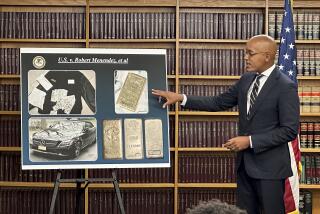Senators’ Book Questions Bush Irangate Role
- Share via
WASHINGTON — The role of Vice President George Bush in the Iran-Contra affair remains an important unanswered question in the presidential campaign, according to a new book by two senators--a Democrat and a Republican--who investigated the scandal.
The two authors, Maine Sens. William S. Cohen and George J. Mitchell, conclude that the Republican nominee should have been aware that an arms-for-hostages deal with Iran was being arranged and that he endorsed it. Cohen, a Republican, and Mitchell, a Democrat, were members of the congressional Iran-Contra investigating panel and the first insiders to write their own book about the inquiry.
“The vice president endorsed the sale of weapons to Iran either out of loyalty to the President or because he, too, was consumed by the passion to obtain the freedom of the hostages,” the two senators wrote in the book, “Men of Zeal: A Candid Inside Story of the Iran-Contra Hearings.”
Bush campaign spokeswoman Sheila Tate said there will be no immediate comment on the book because “we haven’t seen it.”
‘Out of the Loop’
Bush has sought to put the affair behind him, saying repeatedly that while he nominally was President Reagan’s anti-terrorism chief, he was “out of the loop” on the Iran matter and didn’t understand a briefing on the arrangements he received in August, 1986, more than three months before the affair became public.
But he has also refused to talk about any discussions with Reagan about the matter. Cohen and Mitchell write that while it is possible Bush cautioned against the deal, evidence shows that others in the Administration were convinced that the vice president supported it.
And they voice the opinion that even if Bush was not brought into the decision-making on this major foreign policy initiative, “his position (of support) would have remained the same.”
“Whatever his personal views, the vice president cannot publicly disagree with the President’s policies or action without fracturing the bond of unity they must maintain,” they wrote. “The vice president lacks flexibility to express his views even in private Cabinet-level sessions. . . . “
More to Read
Get the L.A. Times Politics newsletter
Deeply reported insights into legislation, politics and policy from Sacramento, Washington and beyond. In your inbox twice per week.
You may occasionally receive promotional content from the Los Angeles Times.










